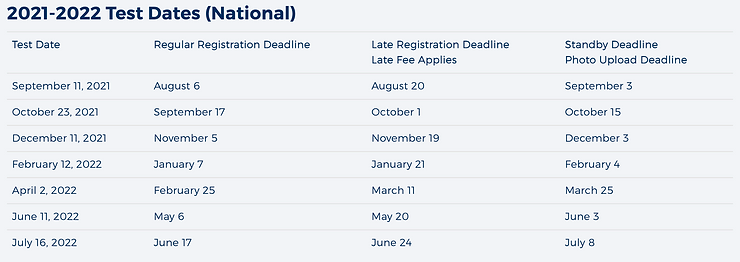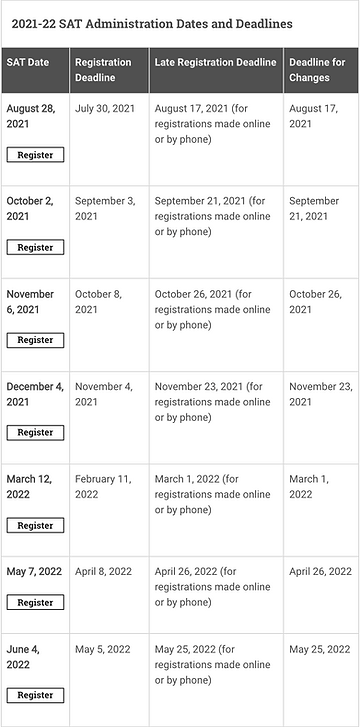
Taking standardized tests has long been an important part of the college application process, and nowadays there are several different kinds of tests that students will encounter. Even though some universities are becoming test-optional, meaning that they won’t be required to send scores as part of the application, it is still highly recommended that you take the tests if you can since high scores can still contribute positively to your academic profile.
However, it’s not always clear to students and their parents exactly when they should take these tests, and with multiple dates and types of tests offered, the choice can be difficult. While some tests like the PSAT and individual AP tests are only to be taken once, students can take the ACT and SAT as many times as they want. And these different tests carry different weights in the college admissions process.
Here are our insights into when you should take each of these tests and what a general preparation schedule may look like.
SAT and/or ACT Tests
The SAT and the ACT are the main two standardized tests that students take during their high school career, and they are usually necessary to apply to college. The SAT is run by The College Board, which also runs AP courses and the PSAT, and the ACT is administered by the ACT, Inc., originally an abbreviation for American College Testing.
They are offered seven times a year on average on Saturday mornings at local high schools across the country (except during the pandemic, when some were offered online). You can register online, where you will find more information about specific testing procedures.
Here are the upcoming dates for the ACT…

…and the SAT.

Even though these tests don’t cover course-specific material, it is still a great idea to study. Your high school coursework will come in handy in developing many of your skills, but each test has its own structure and mechanisms that you can learn inside and out, which will definitely improve your score. We recommend that you prepare at least 3 months in advance of your first test date and, if you choose to take it again, develop a specific plan that will help you target any weaknesses you may have had during your first test. Practice tests straight from each testing company (SAT and ACT) or Khan Academy are helpful, and you may also choose to work with a tutor.
As for when you should take the SAT or ACT, it depends on the student. Some students take both tests while others prefer one over the other. While you can register for these tests as many times as you’d like, it’s recommended that students don’t take the tests more than three times each. Taking the test too many times without much of a score difference isn’t a great look to schools. If you’re looking to raise your score, increase the amount of prep work you’re doing in between test dates and maybe space those dates out so you have adequate time to prepare.
It is also important to note that a few colleges require you to send all of your standardized testing scores for a given test, so start with a practice test to see where your strengths lie instead of going in completely cold. If you’ve got a dream school in mind, check their testing requirements for admission and see what the general score range for admitted students is.
Other colleges will super score your test, meaning that they’ll take your highest score in each section and combine them to get a different composite score, which often works in a student’s favor.
Regardless, the best advice is to take the tests when you feel ready, and for many students, that is when they feel like they’ve exhausted all the practice resources available to them. The best way to gauge your possible performance in the testing room is by timing and scoring a practice test in the weeks leading up to your date — that way, you have a clearer sense of potential areas for improvement and the areas in which you won’t need to spend much time studying. It may be wise to pick a testing date when students don’t have other strenuous commitments and will be able to dedicate all of their attention to performing well.
It’s also important to note that each test has different sections with different time limits, and the format of the questions is not the same for both. The SAT is 3 hours long with 3 sections, while the ACT is 2 hours and 55 minutes long with 4 sections. While the ACT has 215 questions, students usually take about 20-30 seconds longer per question to complete the SAT’s 154 questions. These time differences can make a big difference for students who struggle with a particular section. Even though they both test Reading, Math, Science, and English/Writing and Language, the styles of questions and objectives are different. We recommend taking a practice test for both to see which you prefer, if either. While it’s still a good idea to take both tests just in case, as with all standardized tests, you’ll do better if you know which you prefer.
PSAT (a.k.a. PSAT/NMSQT)
The PSAT, also known as the Preliminary SAT/National Merit Scholarship Qualifying Test, is only offered once in a U.S. student’s high school years, usually in the 10th or 11th grade. The date is determined by your school, so if you’re not sure when you’re scheduled to take it, ask your guidance counselor.
This test, as the name suggests, can qualify you for the National Merit Scholarship Program based on your score. There are different score cutoffs based on each state that vary year to year, but if you exceed that cutoff, you will move into the next round of the program as a semifinalist. This can eventually offer you scholarships, some full-tuition, to many different schools.
Below are the score cutoffs by state for the class of 2021. While these change every year, the previous scores are good predictors of future cutoff scores.
State Class of 2021 Score Cutoff
Alabama 212
Alaska 212
Arizona 218
Arkansas 212
California 221
Colorado 217
Commended* 209
Connecticut 220
Delaware 219
D.C. 222
Florida 216
Georgia 219
Hawaii 217
Idaho 214
Illinois 219
Indiana 215
Iowa 212
Kansas 214
Kentucky 214
Louisiana 212
Maine 213
Maryland 221
Massachusetts 222
Michigan 216
Minnesota 218
Mississippi 211
Missouri 214
Montana 210
Nebraska 213
Nevada 215
New Hampshire 215
New Jersey 222
New Mexico 211
New York 220
North Carolina 217
North Dakota 209
Ohio 215
Oklahoma 211
Oregon 217
Outside US** 222
Pennsylvania 217
Rhode Island 216
South Carolina 212
South Dakota 209
Tennessee 215
Territories 209
Texas 219
Utah 212
Vermont 212
Virginia 221
Washington 220
West Virginia 209
Wisconsin 213
Wyoming 209
*Commended students fall within the top 3% of scorers and do not advance in the National Merit competition, whereas semifinalists fall within the top 1% and advance in the competition.
**Non-US citizens can take the test, but won’t qualify for National Merit. US students studying abroad can take the test outside of the country and will still be in the running for National Merit.
The PSAT is not as important as the SAT or ACT in the college admissions process, and the only benefit that you may gain (aside from some SAT practice) is advancing in the National Merit contest. If that is a goal of yours, since you only have one shot to take these tests, and selecting the test date is out of your control, it’s imperative that you take time to prepare. We recommend at least 3 months before the test that you do practice tests or work with a tutor to help you get comfortable with the material. Make sure that you time yourself on your work so that you’re not thrown off by time limits on your test dates.
AP Tests
AP Tests are offered to students who have completed year-long AP courses, which are classes offered by schools with a curriculum designed by The College Board. Some schools require students to take AP tests at the conclusion of their classes while others leave the decision up to the student. I’d strongly recommend that, if given the opportunity, you should take the test.
Unlike the ACT and SAT, AP scores, which range from 1-5, do not need to be reported on college applications and no official scores must be sent to universities. Students can simply self-report their scores, and while it may look strange that you’re not reporting a score, you could choose not to include your scores. However, you should definitely take AP tests if you can — there is also the possibility of gaining college credit through certain AP courses, depending on the college’s credit system. Plus, high scores on AP tests can contribute positively to a student’s chances of admission, especially at highly selective colleges.
With the right planning and preparation, you can make the standardized testing process as stress-free as possible. One of the best ways to prepare is to work with a tutor. If you’re interested in learning more about H&C’s test prep services and long-term planning, don’t hesitate to set up a free consultation today with our college admission consultants.
